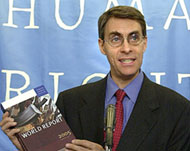US, UK get blame for Iran unrest
Iran has accused the United States and Britain of stoking the unrest that has broken out among its Kurdish and Arab minorities.

Foreign Ministry spokesman Hamid Reza Asefi offered little evidence for his allegations on Sunday, but suggested that Washington and London were giving encouragement to the Arabs and Kurds who have rioted in western and northwestern Iran.
“According to some information, the Americans intervened in northwestern Iran. This is not acceptable at all,” Asefi told a news conference. “We will voice our objection in this regard soon.”
Asefi said the United States is stuck in Iraq and is trying to divert attention from its plight by sowing unrest across the border.
Under US protection, Iraq’s Kurds have enjoyed autonomy and a booming economy, fuelled partly by trade with Iran. Iraq’s ascendant Kurds engage in contacts – including lucrative exports of illegal liquor and other goods – with their kin across the border.
Kurdish protest
|
“According to some information, the Americans intervened in northwestern Iran. This is not acceptable at all” Hamid Reza Asefi, |
On Thursday, Human Rights Watch said at least 17 people had been killed and hundreds more injured and arrested after anti-government protests broke out in Iran’s Kurdish northwest.
The New York-based rights group blamed the killings on the Iranian security forces, and said their indiscriminate shooting had also wounded hundreds of people.
Asefi also said a spate of previous riots in Iran’s western Khuzestan province was encouraged by the British presence in Iraq.
In April, minority Arabs rioted against the government, leaving at least one protester dead and several injured.
Minority Arabs
More than 200 people were arrested. Khuzestan abuts southern Iraq, where security is under the control of British soldiers in the US-led force.
“Some provocateurs were trained in a part of Iraq which is under control of Britain,” Asefi said. “We have made objections and warned Britain about the repercussions of such behaviour. We hope it won’t be repeated in the future.”
In Kurdistan, the unrest rocked several towns over the past month. The killings and arrests led to more protests, with shopkeepers shuttering their businesses and the government closing down two newspapers and detaining journalists and activists.
Security forces were also said to be among those hurt and killed in the unrest. Residents have said undeclared martial law is in force.
Human rights activists
“Peace has returned to the area, but security is tight. Dozens of activists are still in jail,” said Kurdish activist Vahed Qaribian.
 |
|
Human Rights Watch says Iran |
Those jailed include Ajlal Ghavami, Saeed Jalali and Roya Toloui, a women’s rights activist. Human Rights Watch (HRW) said the security forces wounded hundreds when they opened fire in Mahabad on demonstrators who were protesting against the police killing of a Kurdish activist, Shivan Qaderi, on 9 July.
The Iranian authorities say the rioters broke shop windows and set cars on fire. The Kurdish opposition group PEJAK, which stands in Kurdish for the Party of Free Life of Kurdistan, has called on Kurds in western Iran to begin civil disobedience. Iran’s Kurdistan Democratic Party has issued a similar call.
Asked about PEJAK’s role in the unrest, Asefi said that Iran would “confront all terrorist groups”. Iranian media have suggested the protests were rooted in the poverty that remains prevalent in the Iranian Kurdish areas.
The findings of investigations carried out by Iran’s Interior Ministry and parliament have not been published.